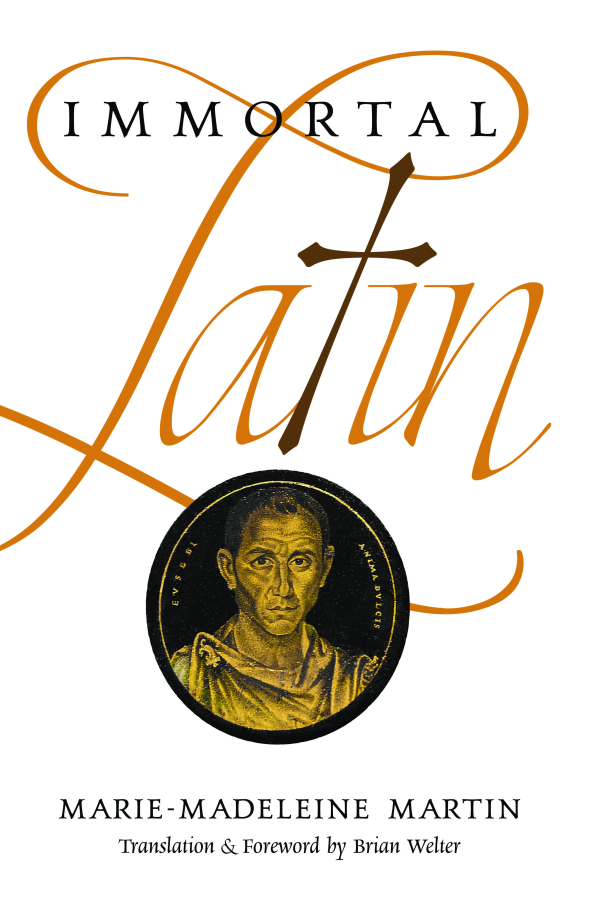Immortal Latin
- Product Code: iml
$18.95
- 10 or more $16.80
-
Originally published in 1966 as Le Latin Immortel. This English edition is taken from the 4th French edition published in 1989 by Éditions Reconquista. Permission granted for this English translation.
In 1964–65, the Roman Catholic Church brutally and almost universally abandoned the Latin language. This sparked a violent polemic in some places, with often superficial arguments. At that point, a French writer published a far-reaching study. The historian Marie-Madeleine Martin, former student of the École des Chartes and first female winner of the Grand Prix Gobert d’Histoire, developed the following argument: “We maintain that in this instance, the debate extends to every part of society, and beyond the purely religious terrain. It concerns the history of the world because Rome’s least contested glory is its major contribution to universal civilization. Rome was not a nation, or did not remain as one for long. The empire it established reigned over East and West. Rome found the means to enable diverse peoples and civilizations to live together, thereby providing an enduring message which is valid for every human city.” “In 1910 the great Italian writer Guglielmo Ferrero...noted: ‘Rome’s history, and hers alone, is universal, which is why she cannot be similar to dead empires.’” Certain chapters of Immortal Latin will arouse intense surprise in the reader:
• the demonstration of Rome’s role in what is called the primitive Greek church;
• a completely new painting style, traced back to the Renaissance;
• beautiful seventeenth-century European frescos;
• the revelation of an attempted French liturgy on the eve of the French Revolution;
• ceaseless attacks against Latin in the last three centuries;
• the demonstration of Latin’s character of UNIVERSALITY. -
A Few Reflections on the First Edition of Immortal Latin
Marie-Madeleine Martin's new book affirms more than her previous ones the gifts of an original-thinking and passionate graduate of the École des Chartes. Martin's vigorous writing creates an uncommon synthesis of the power of love and faith in the subjects that she analyzes.
—Maurice Rat (La Revue des Deux Mondes)
In reading your book, I think that it is your masterpiece so far. You know how much I value your other books. It seems to me that with this one, you are announcing a crusade.
I was keenly interested in your parallels between Latin and Greek in which you don't deny Hellenic culture, but show everything that it owes to Latin because this latter remade and supported it.
—Duc de Levis Mirepoix (de l'Académie française)
The title surpasses the value of a simple label. It conveys with a sort of prescience what Marie-Madeleine Martin does in her new book.... But who is still concerned with prophets today?
Barbarism is once again upon us. After breaching the Aurelian Wall, it spread throughout the City. But is it enough to treat as dead the two most alive human languages so that they pass directly from life to their end?... With her usual clarity, Marie-Madeleine Martin helps us see that after feasting on Hellenism, Latin entered into contact with the mystery of the Incarnate Word.... Latin became the universal language, that of minds and souls, and put an end to Babel's incoherent transcendence.
—Hubert Colleye, Brussels
The serious question that Marie-Madeleine Martin courageously deals with is this: Society's progressive secularisation unfortunately coincided with the Church's long intellectual stagnation and then with the decline of the so-called humanist culture to the profit of technology and science.
We play a very big game in pushing forward an overly-easy and natural evolution. The longer that Latin survives in the Church, the city, and the court, the longer we can delay the final catastrophe, which is the collapse of intelligence.
—André Thérive (Carrefour)
Reviews (0)
Be the first to write a review for this product.



-200x200.png)
